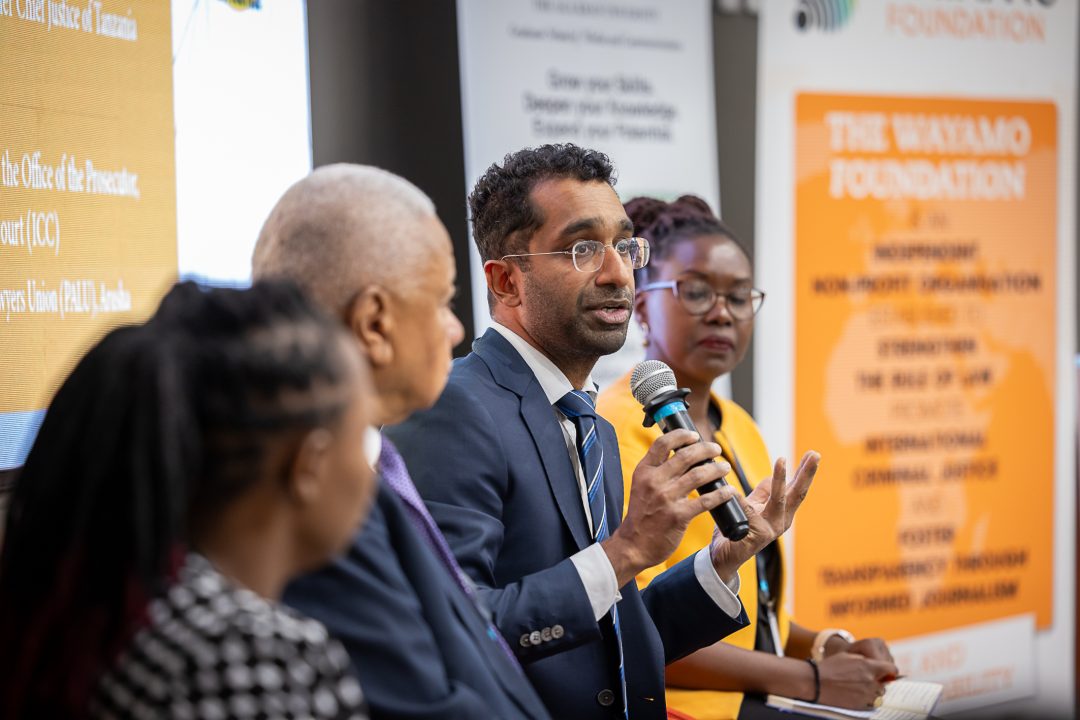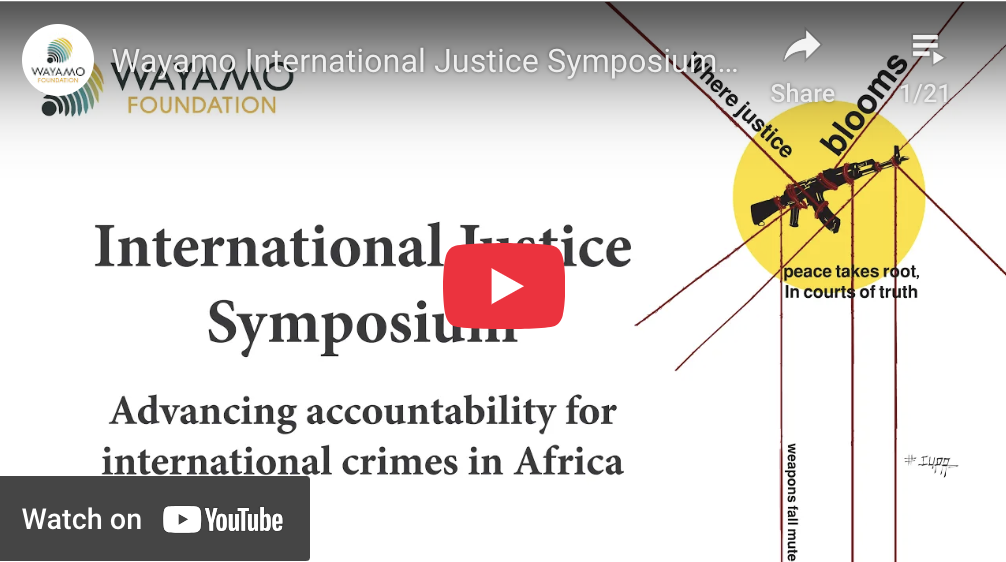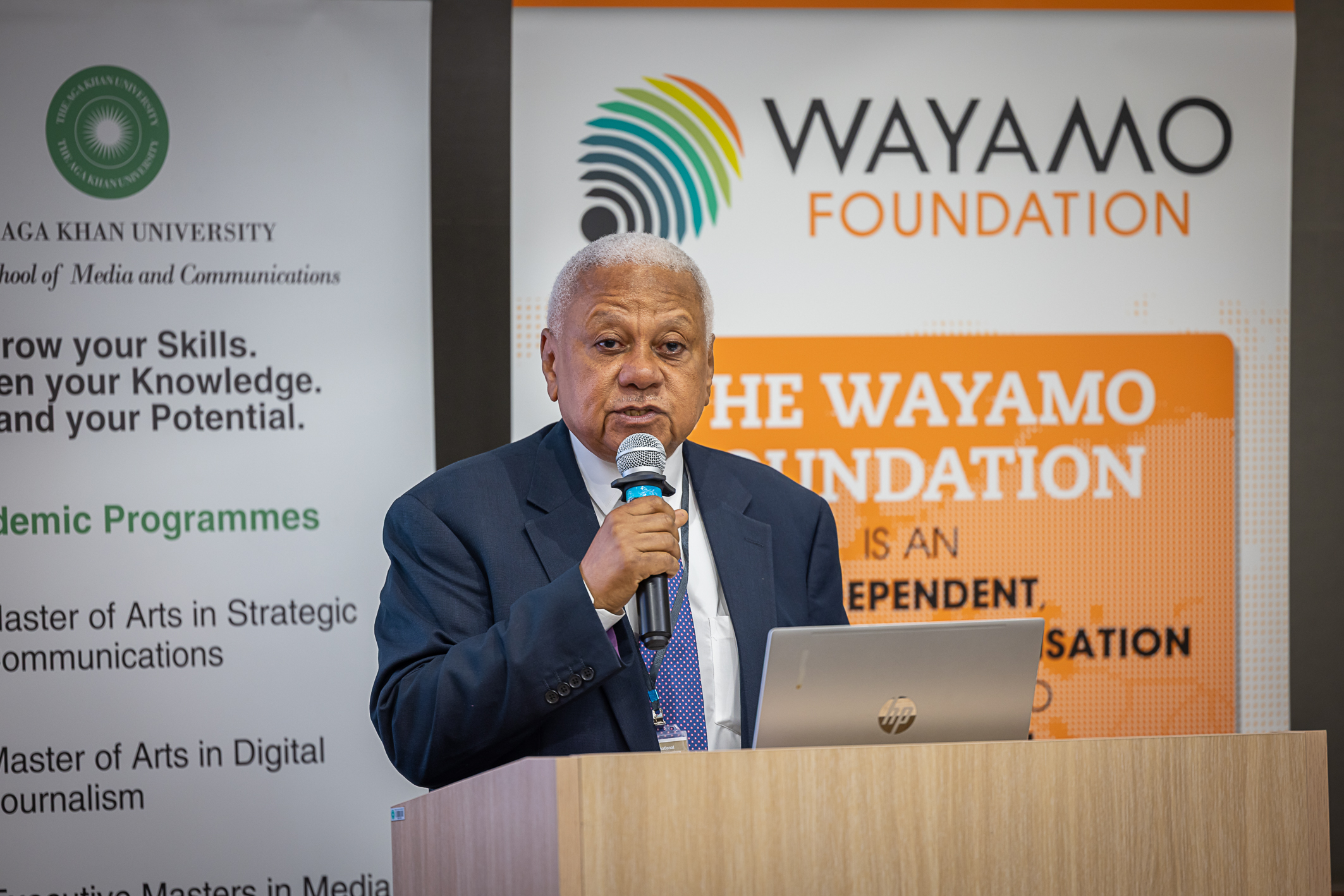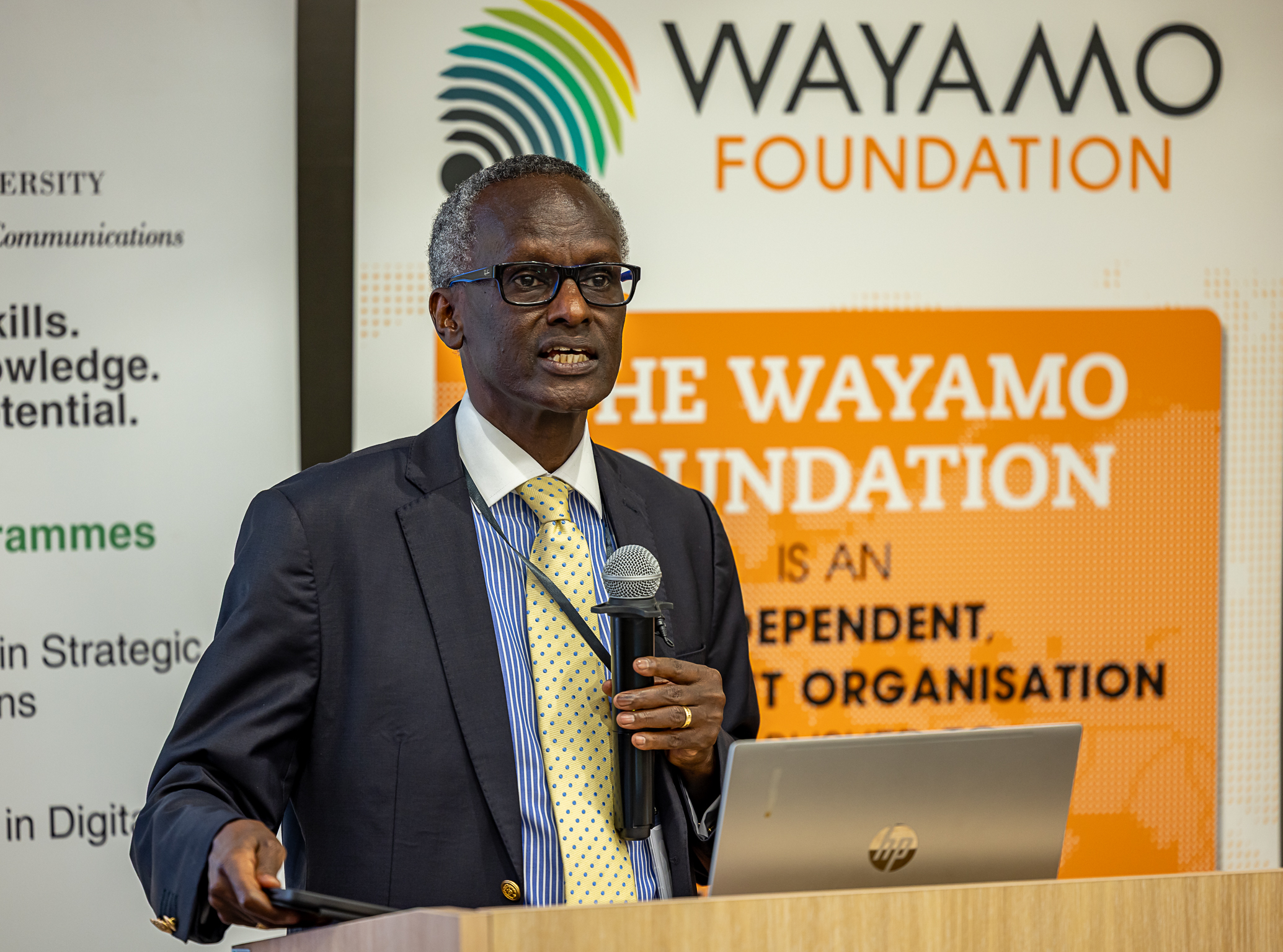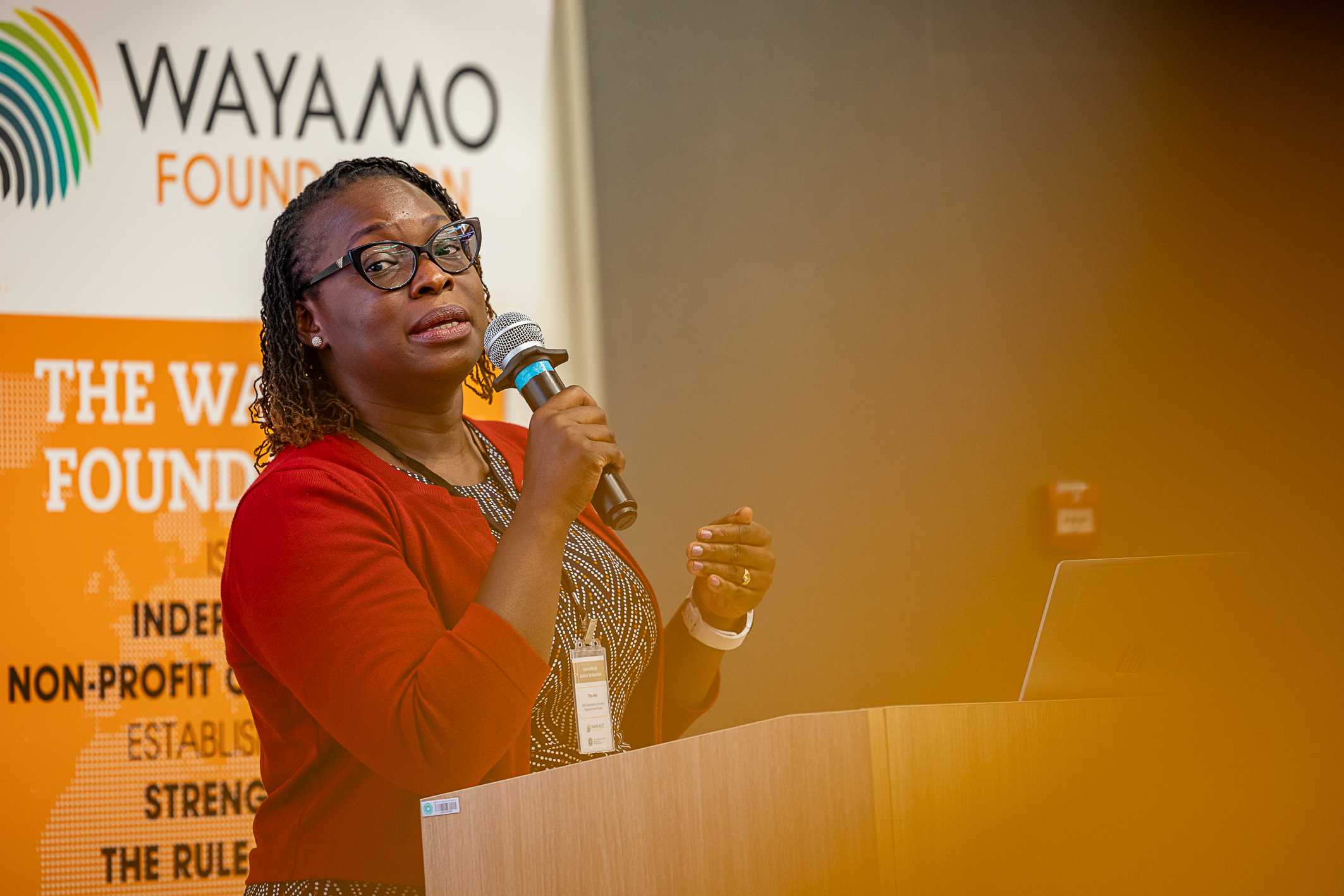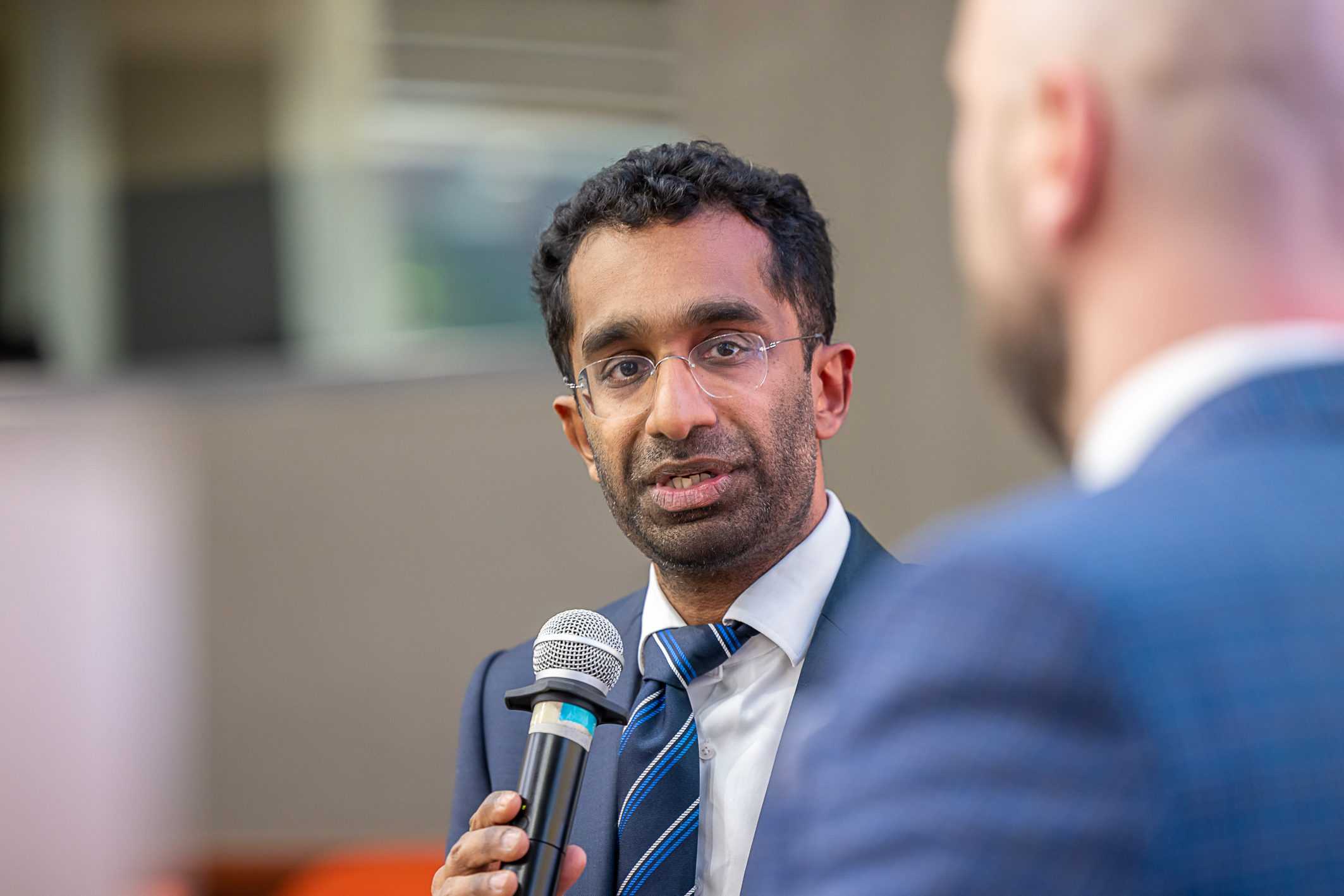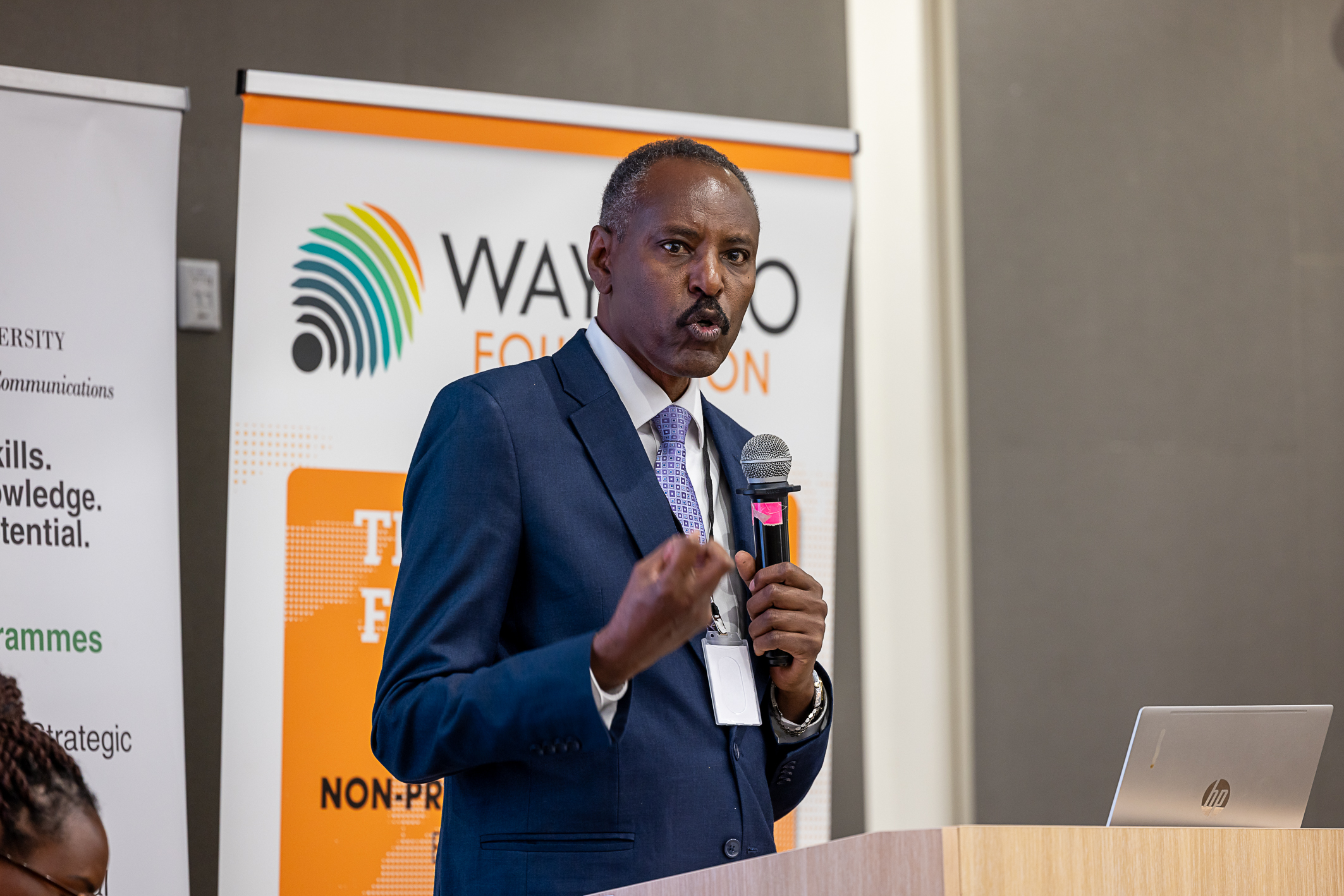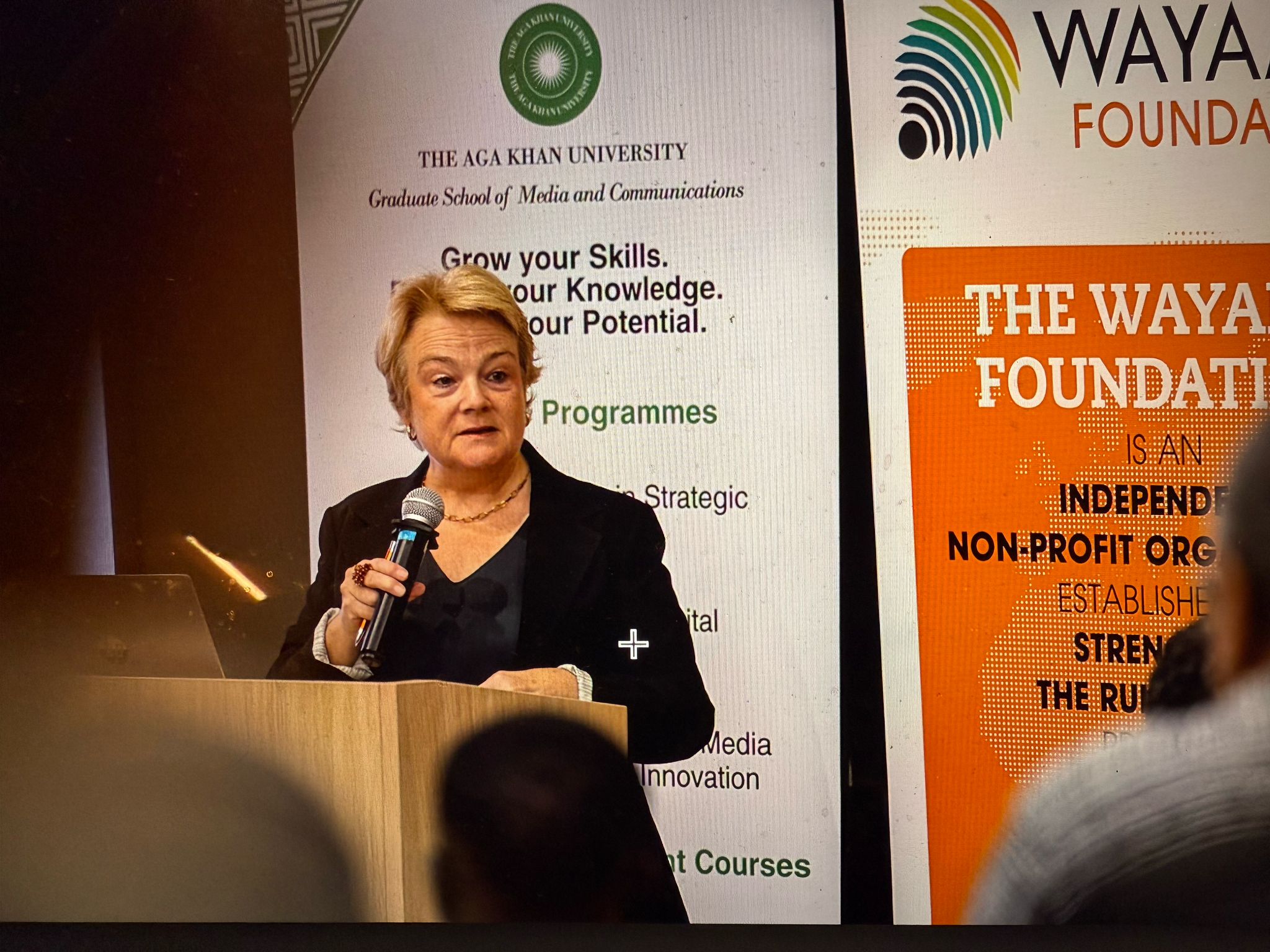Nairobi, Kenya: On 21 February 2025, the Wayamo Foundation convened experts from across the globe for a symposium on the subject of “Advancing accountability for international crimes in Africa”. The entire symposium can be viewed online at the link below, or click on each speaker’s name to watch their contribution.
The event, held at Nairobi’s Aga Khan University, focused on identifying appropriate and creative means and mechanisms to advance accountability for international crimes. Experts spoke about emerging tools and avenues which could be used to disrupt international crimes and the networks that make atrocities possible, including in the ongoing armed conflict in Sudan.
The event also featured artwork from Sudanese artist Mohamed ‘Cupa’ Alhassan (Instagram) and photography from award winning Sudanese photographer Faiz Abubakr Mohamed, (Instagram) renowned for his compelling documentation of Sudan’s socio-political landscape.
PANEL 1: A Framework for Justice: Identifying pathways to accountability in Sudan through regional and international human rights investigative mechanisms and international courts
The symposium began with a panel focused on identifying pathways to accountability in Sudan through regional and international human rights investigative mechanisms and international courts.
Mohamed Chande Othman, Chairperson of the UN Fact-Finding Mission on Sudan outlined the findings of his team and called for more to be done to stop the violence.
“Access to Sudan has been denied for us and all other accountability organisations,” said Chande Othman, highlighting the need to work creatively to pursue justice and accountability. “But we have been able, through cooperation, to work in Chad, Uganda, Kenya and Ethiopia, where our investigation team has been able to collect direct evidence, as we continue with remote investigations.”
“I think no one organisation or agency can fully do the work, and that is why I joined Wayamo here,” said Chande Othman. “We urge this coalition to be productive, to continue to exchange on the basis of, of course, respecting each other’s mandate and so on. But I can say the work is not finished.”
“There are gaps to be filled. But I think that together we are able to advance the accountability agenda and to try to assist our Sudanese brothers and sisters in really narrowing down, limiting the impunity gap.”
Pubudu Sachithanandan, trial lawyer and lead for recent crimes in Darfur at the Office of the Prosecutor of the International Criminal Court (ICC), outlined the limitations of its mandate which is limited to Darfur, but pointed to the success of the recently concluded Ali Muhammad Ali Abd-Al-Rahman commonly known as “Ali Kushayb” case as a “small success” that points to the possibilities of the ICC. The continuity of the crimes taking place there since 2004 allowed the ICC to extend its mandate to also investigate crimes committed after the outbreak of the war in April 2023.
Stella Ndirangu, AU Advocacy Lead at the International Federation for Human Rights (FIDH) called on the African Union to pursue complementary efforts as well to bring justice to the victims in Sudan.
“Documentation is the first step. Then we need to ask ourselves how to take the documentation process to the next level, which are possible criminal prosecutions,” she said. “We need to keep pushing the African Union to establish effective accountability mechanisms for Sudan.”
Commenting later in the day, Donald Deya, Chief Executive Officer, Pan African Lawyers Union (PALU), suggested that accountability is possible, noting that the African Union’s position on universal jurisdiction is “Please, member states, upgrade your legal frameworks to be able to robustly try universal jurisdiction cases.”
PANEL 2: Domestic justice for international crimes: Examples, successes and challenges
The day’s second panel focused on examples, successes and challenges of pursuing domestic justice for international crimes and engendered a spirited discussion on the role of civil society in pursuing justice for international crimes at the domestic level.
Judge Isaac Lenaola of the Supreme Court of Kenya opened the panel with remarks on advancing the rule of law in Kenya and opportunities brought about by the Rome Statute of the International Criminal Court. He focused specifically on the “Baby Pendo” case, where twelve senior police officers were charged in October 2022 with crimes against humanity, including murder, rape, and torture, under Kenya’s International Crimes Act. Mark Barasa, Kenya’s Senior Assistant Director of Public Prosecutions also gave an update on the case from the audience.
“Let us not miss opportunities to bring potential international crimes under the International Crimes Act, because only then can the bounds of jurisprudence and law be tested sufficiently for us to be confident that they work,” said Isaac Lenaola. He later added that “the Baby Pendo case is a test case for the Kenyan International Crimes Act of 2008” stressing that laws are meant to be tested.
In that spirit, he encouraged prosecutors and civil society actors to be creative and brave.
“Bring strategic litigation to us, let us build universal jurisdiction into our processes, let us test the law and let us be bold,” he said. “We need judicial creativity and to create progressive jurisprudence.”
Sara Kasande, who leads the Kampala office at the International Centre for Transitional Justice, spoke about international criminal law in Uganda, providing a comparative analysis of both domestic and international case law and the lessons learned for future accountability initiatives. She stressed that justice and accountability are complex.
“Whatever conversations that are happening about amnesties must be careful not to foreclose the possibility of accountability,” she said.
Tina Alai, Transitional Justice Advisor, United Nations Commission on Human Rights in South Sudan, noted the importance of tracking crimes across borders due to regional discruptions such as refugee flows and recalled the long trek toward accountability in Kenya where incremental change has followed numerous setbacks.
“Nowadays there is a certain interconnection of states who care about crimes being committed in the neighbouring states,” she said. “The documentation of serious human rights violations is very important as it preserves evidence for later accountability. Then we need creative, strategic and incremental prosecution.”
Adejoké Babington-Ashaye, International Law Expert with a focus on accountability for sexual and gender-based violence, noted that political will undeniably shapes international justice efforts, however, history teaches us that power shifts occur and those fighting for justice must be ready when the time comes.
“As is commonly said in Nigeria, ‘no condition is permanent,'” she said. “Even if cases cannot be brought now, strategic case-building ensures that when the moment arrives, justice is ready to be served. Leaders once thought untouchable — like Omar al-Bashir or Hissène Habré — eventually saw their fortunes reversed.”
Babington-Ashaye also stressed the importance of creative and strategic case-building.
“While direct perpetrators remain a focal point, impactful justice strategies also target the enablers of atrocities — businesses, financial institutions, and networks that sustain human rights violations,” she said. “Legal frameworks should be applied creatively to hold these actors accountable, whether through sanctions, judicial proceedings, or economic deterrence. Disrupting the operational capabilities of perpetrators can be an effective form of justice, even in the midst of ongoing conflict.”
A conversation with the International Criminal Court
Watch the Conversation on YouTube
Following the second panel, Mark Kersten, Wayamo’s Senior Consultant and Assistant Professor of Criminology and Criminal Justice, University Fraser Valley, Canada, engaged in a conversation with Pubudu Sachithanandan, lead for recent crimes in Darfur at the Office of the Prosecutor of the ICC on the meaning and importance of the ICC’s 2024 policy on complementarity and whether the court can work proactively with national authorities to investigate and prosecute international crimes.
“The new complementarity policy of 2024 expresses the ICC Office of the Prosecutor´s renewed desire to assist with domestic prosecutions, together with the recognition of our limitations,” said Sachithanandan. “It is definitively not a competition of domestic and international criminal mechanisms. National, regional, international accountability mechanisms are all on a spectrum. And civil society organisations feed in all parts of this spectrum.”
PANEL 3: Creative ways to interrupt the perpetration of international crimes in Sudan
The third and final panel discussion of the day focused on creative ways to interrupt the perpetration of international crimes in Sudan.
Sudanese legal expert Mohamed El´numan laid the groundwork with an analysis of the possible political outcomes of the Sudanese conflict, noting that justice inside Sudan would be extremely difficult to achieve.
“Both political players are characterised by their lack of interest in accountability,” he said. “These scenarios make a transitional justice program that addresses current and historical grievances throughout the country very unlikely.”
Nick Leddy, Head of Litigation, Legal Action Worldwide (LAW), highlighted his organisation’s efforts at strategic litigation outside Sudan.
“If we want to end impunity, we have to use domestic courts, we have to exercise every avenue we can in the interests of our clients, in particular using universal jurisdiction where possible, to make sure that we do whatever we can to close the impunity gap,” he said, noting that LAW was working with Sudanese groups on building cases.
Christopher Kiyaseh, Analyst, Center for Advanced Defense Studies (C4ADS) highlighted his organisation’s work in using deep research and data layering to better understand and where possible disrupt the criminal networks in Sudan. He pointed to the example of conflict financing through banks.
“These institutions are pervasive and have been used to further and prolong the conflict by the warring parties through the obfuscation of assets, as well as continuing the flow of money in and out of the country,” said Kiyaseh. “We need to ask ourselves who are the conflict-enablers? Through that, you’re able to identify those individuals. You’re able to identify those entities who are able to identify those assets and use that to put pressure on the warring parties.”
Wayamo’s Senior International Legal Advisor Mikel Delagrange picked up on the need to be creative because the accountability landscape has changed.
“In the old days when conflict was raging, the law had to wait. But now we can already disrupt criminality in an ongoing armed conflict,” he said. “Let us focus on what we can achieve now; use different tools to get in the way of the criminals like sanctions, financial investigations, asset recovery, using open-source information.”
He also stressed the importance of civil society organisations and documentation efforts that can meet a legal standard.
“The foundational stone of any accountability process are the Sudanese documenters of human rights violations,” he said. “The documentation work needs to be continued and deepened until it has juridical value. When you document for accountability, you can use that for advocacy. It does not work the other way.”
Kaajal Ramjathan-Keogh, Director of the Africa Programme at the International Commission of Jurists, South Africa, weighed in on the creative application of universal jurisdiction in Africa with multiple legal examples of creative prosecutions across the continent and worldwide.
She also stressed the need to be strategic.
“We don’t need to go for 100% of convicting perpetrators all at once. We can move incrementally towards these cases and dealing with international criminal justice issues.”
Cooperation, coalitions and keeping the victims at the centre of justice and accountability efforts
Watch closing remarks on YouTube
Wayamo’s Bettina Ambach had the last word of the day, stressing the importance of cooperation and collaboration in her closing remarks.
“We can disrupt criminality even in an open ongoing armed conflict like the one in Sudan,” she said, pointing to the theme of legal creativity and cooperation which emerged over and over again during the day’s discussions.
“It’s important that we join forces, and I think that idea of building coalitions between civil society, the ICC and UN investigative mechanisms , was one idea which went through all the panels at the symposium.”
She also stressed the importance of keeping the victims central to the work, a point stressed repeatedly throughout the day.
“The victim voices. Where are the victim voices? Are we including them often enough? Do we always ask what kind of justice victims want?”
With the financial support of the German Federal Foreign Office and the Ministry of Foreign Affairs of the Netherlands.

